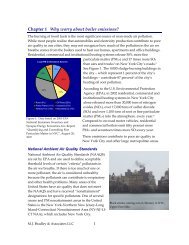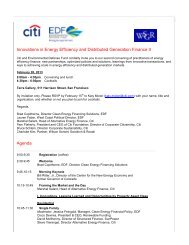Chris Brown President, Rhode Island Commercial Fishermen's ...
Chris Brown President, Rhode Island Commercial Fishermen's ...
Chris Brown President, Rhode Island Commercial Fishermen's ...
You also want an ePaper? Increase the reach of your titles
YUMPU automatically turns print PDFs into web optimized ePapers that Google loves.
<strong>Chris</strong> <strong>Brown</strong><br />
<strong>President</strong>, <strong>Rhode</strong> <strong>Island</strong> <strong>Commercial</strong> Fishermen’s Association<br />
It was once believed that there was an unlimited supply of fish in the oceans. But the reality is that<br />
the fish have been no match for the rapid increase in the world’s fishing fleets and new technology.<br />
According to the FAO, there are about 38,400 vessels greater than 100 tons in the world's fishing<br />
fleet. The UN found almost nine out of ten fish populations are now fully exploited or over<br />
exploited. There are just too many boats chasing too few fish. In many parts of the world there is<br />
still little to no fisheries management.<br />
In the U.S. we’ve seen many of our fish populations decimated and there is no region that has been<br />
hit harder than New England. The legendary cod stocks in New England were once described as “so<br />
plentiful you could walk across their backs.” But ineffective regulations and a huge jump in the<br />
number of boats catching cod created a perfect storm that caused a collapse in the cod fishery here.<br />
In just ten short years (between 1990-2000) the amount of cod caught dropped 88 percent. The cod<br />
and the environment weren’t the only causalities; about 20,000 New England fishermen lost their<br />
jobs.<br />
One of the fishermen who was still standing after the collapse of cod is <strong>Chris</strong> <strong>Brown</strong>. <strong>Chris</strong> has been<br />
a commercial fisherman for more than 35 years fishing out of Port Judith, RI.<br />
<strong>Chris</strong> was just eight years old when he first went to sea. That was in the 1960s and he went with his<br />
grandfather. When <strong>Chris</strong> was 20 he built his first boat, the Grandville Davis, which was his pride<br />
and joy for 31 years. When <strong>Chris</strong> first started fishing the waters of RI there were plenty of fish to go<br />
around—from cod, yellow tail flounder, fluke, and scallops.<br />
Back then, fishermen did what they wanted with few rules. <strong>Chris</strong> says the trouble with the<br />
“anything goes” fishing is that “everything went.” There was little left to catch by the late 80s. First<br />
there were drops in the number of cod, striped bass, yellowtail, fluke, and then even less desired<br />
species such as scup and whiting started to collapse.
The National Marine Fisheries Service, the government agency responsible for setting the rules for<br />
fishing, finally realized how bad things got. With the best intentions, they decided to try to control<br />
overfishing by setting obstacles in the way of fishermen so they wouldn’t catch as much. They tried<br />
to control when, how and where fishermen fished. They gave them limits on the number of days<br />
they could fish, how many fish they could catch within a certain time period, and what kind of<br />
equipment they could use. It resulted in a cat and mouse game, but the fishermen were always one<br />
step ahead. Overfishing continued, and fishermen had to live with a lot of headaches created by the<br />
obstacle course the government put in front of them.<br />
With only a limited number of days to fish each year, <strong>Chris</strong> had to race as he was fishing. He was<br />
forced to ignore the conservation ethic that his grandfather taught him, fishing fast, aggressively<br />
and recklessly. He often set his equipment on fish schools that he knew only contained a small<br />
percentage of the target fish. When the nets came up all the fish died, but only the target species<br />
were allowed to be kept. All the other fish were thrown overboard. The fish formed a trail,<br />
sometimes miles long behind a boat <strong>Chris</strong> knew what he was doing was wrong, but he had no<br />
choice to stay in compliance with the regulations.<br />
He also was forced to choose between his bread and butter and his safety. With a limited number of<br />
days on the water, if he was out fishing and bad weather hit he could either call it quits and use up<br />
one of his allocated days of fishing without much to show for it. OR, he could keep going and say a<br />
prayer.<br />
<strong>Chris</strong> also complained about how at one time the rules limited how much fish he could catch per<br />
day. So, if he caught too much cod one day he would be forced to wait out at sea in what he called<br />
“cod jail” so that the haul could be counted as the catch for multiple days. If the weather got ugly or<br />
one of his kids had a birthday party at home that day he’d have to make a tough choice.<br />
<strong>Chris</strong> takes ownership and has often said that he and his fellow fishermen were responsible for the<br />
greatest fish collapse the United States has ever seen. <strong>Chris</strong>, who has two boys, did not want them to<br />
follow in his footsteps, because he could see no real future for them in the fishing industry.<br />
Environmental Defense Fund saw that what was going on was a lose-lose situation. The fish<br />
populations were in trouble and the fishermen were in dire straits. We worked hand in hand with<br />
fishermen, scientists and government officials. We put our heads together to design a plan that<br />
could end the downward spiral of New England’s most iconic fish species AND ensure that<br />
fishermen wouldn’t become an endangered species.<br />
Based on research of what was working in other fisheries in the U.S. and in other countries, a<br />
completely different way to manage fish was established for cod and over a dozen other popular<br />
fish in New England.<br />
Starting in 2010 New England’s commercial ground fishermen were given a choice: continue with<br />
the old system or try something new. Fishermen who caught 98% of the groundfish signed up for<br />
the new program called “catch shares.”
Groups of fishermen are allocated a secure portion of the total amount of fish that scientists said<br />
could be sustainably caught. Fishermen can catch the fish whenever they wanted during that yearlong<br />
season and are given incentives, not disincentives, to protect the environment and the fish<br />
populations.<br />
A catch limit is set that allows fish populations to recover. Then, as the fish are doing better,<br />
managers can raise the total annual catch limit and fishermen’s share of the pie grows. According to<br />
<strong>Chris</strong>, they are now making more money selling the same number of fish, burning less fuel doing it<br />
and helping rebuild fish populations.<br />
<strong>Chris</strong> and his fellow fishermen have the option to trade their quota with other boats. For example, if<br />
he catches more than his allotted share—or a species other than the one targeted—he can buy<br />
shares from someone else. Before he’d be required to dump the wasted wish, which is bad for the<br />
environment and like throwing money overboard. In 2010 alone, catch shares in three fisheries in<br />
New England, Pacific and the Gulf of Mexico have saved enough fish from being tossed back dead to<br />
feed an estimated one million Americans for one a year.<br />
Catch shares gave <strong>Chris</strong> the ability to fish when, how and for what species he chose throughout the<br />
year. This enabled him to start Wild Rhody, a company that delivers fish caught daily straight to<br />
restaurants throughout the region. <strong>Chris</strong> and the fishermen he works with start the day at 3:30 am<br />
so that the fish can be delivered fresh to the restaurant in time for chefs to prepare for dinner. One<br />
of their customers, Chef John Vestal from New Rivers in Providence, <strong>Rhode</strong> <strong>Island</strong> was quoted in the<br />
The New York Times. He said, “I have been buying all the seafood for the restaurant for over a<br />
decade, and what I saw amazed me. The fish was the absolutely most beautiful, fresh, cleanest<br />
seafood I had ever seen.”<br />
Wild Rhody would not have been possible under the old regulations which severely limited the<br />
number of days fishermen could be on the water. With catch shares <strong>Chris</strong> can fish year round and<br />
only catch what is desired to serve that night.<br />
Initially, <strong>Chris</strong> was adamant that his boys did not follow in his footsteps. Although both are now in<br />
graduate school pursuing another career track, <strong>Chris</strong> recently said he wouldn’t mind if his boys<br />
became fishermen. In his eyes it is a great way to make a living. <strong>Chris</strong> says he can now see a future<br />
and believes that we have turned a corner.


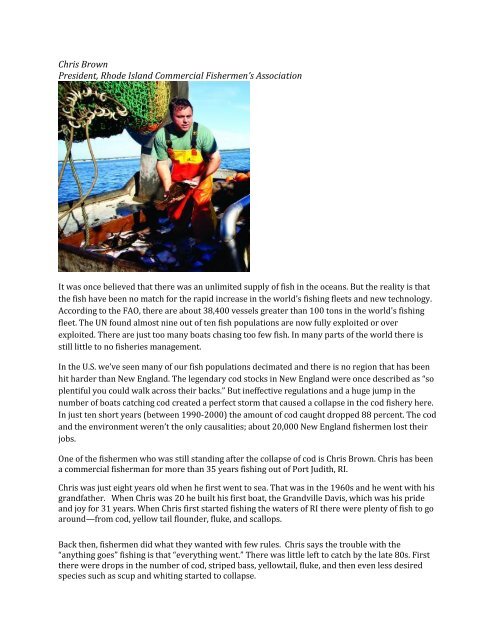
![Annotated bibliography [PDF] - Environmental Defense Fund](https://img.yumpu.com/50613332/1/190x245/annotated-bibliography-pdf-environmental-defense-fund.jpg?quality=85)

![What do we mean by MSY? [PDF]](https://img.yumpu.com/49525661/1/190x245/what-do-we-mean-by-msy-pdf.jpg?quality=85)
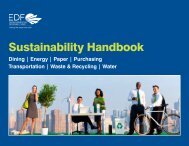
![Print version [PDF] - Environmental Defense Fund](https://img.yumpu.com/46812189/1/190x201/print-version-pdf-environmental-defense-fund.jpg?quality=85)
![Mercury Alert: Cleaning up Coal Plants for Healthier Lives [PDF]](https://img.yumpu.com/45587786/1/190x143/mercury-alert-cleaning-up-coal-plants-for-healthier-lives-pdf.jpg?quality=85)
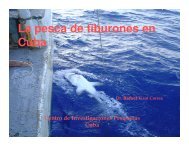

![Program Overview [PDF] - Environmental Defense Fund](https://img.yumpu.com/34005758/1/190x96/program-overview-pdf-environmental-defense-fund.jpg?quality=85)
